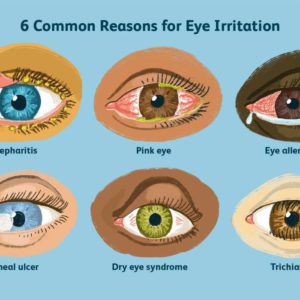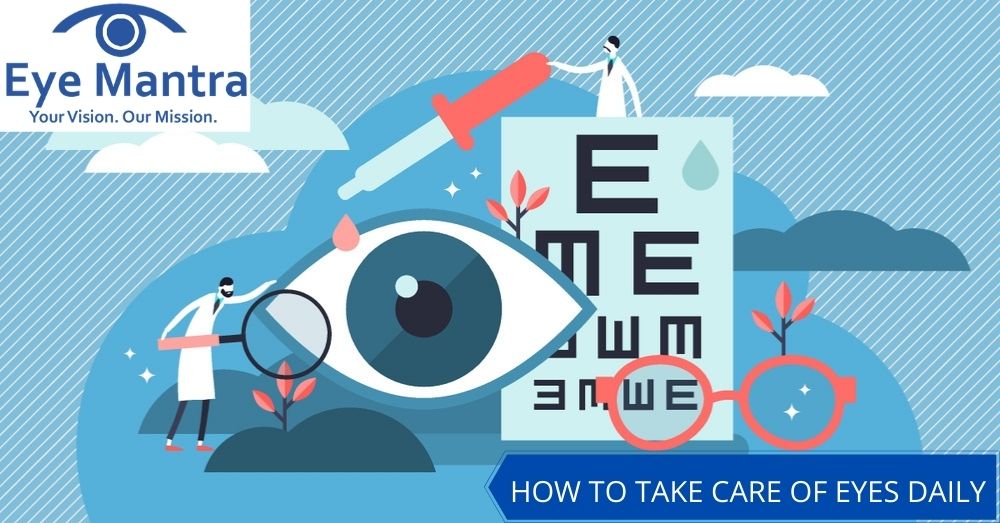Daily Eye Care Tips
Eat Healthy Diet
Your diet ought to embody masses of fruits and vegetables, particularly deep yellow and inexperienced foliate vegetables like spinach and kale. Consumption of fish high in omega-3 fatty acid, like salmon, tuna, and halibut may also benefit your eyes.
Maintain A Healthy Weight
Being overweight or having fleshiness will increase your risk of developing the polygenic disorder. Having a polygenic disorder puts you at a higher risk of obtaining diabetic retinopathy or eye disease. So it’s important to keep a closer look at your weight scale. Maintaining a healthy weight is good for your overall health anyway.
Get Regular Exercise
Exercise might stop or manage the polygenic disorder, high pressure, and high cholesterin. These diseases will result in some eye diseases or vision issues. Therefore, if you exercise frequently, you’ll be able to lower your risk of obtaining these eye and vision problems.
Wear Eyeglasses
Too much sun exposure may damage your eye tissues and lift your risk of cataracts and age-related degeneration. shield your eyes by wearing eyeglasses that block out ninety-nine to one hundred per cent of each UV-A and UV-B radiation.
Wear Protecting Eyewear
To avoid eye injuries, you should wear eye protection while playing sports. If you have a job related to millwork, construction, Always wear a protective shield to protect your eyes from any harmful rays or particles.
Avoid Smoking
Smoking will increase the chance of developing age-related eye diseases like degeneration and cataracts and may damage the optic tract. Smoking causes the weakening of nerves leading to serious diseases that can affect your eyes directly or indirectly.
Know Your Family History
Some eye diseases are inheritable, therefore it’s necessary to find out whether somebody in your family has had eye disorders. This will assist you to confirm if you’re at a higher risk of developing a watch sickness. Knowing about the disease beforehand can help you prevent it.
Know The Symptoms
As you become older, you’re at a higher risk of developing age-related eye diseases and conditions. So if you feel any discomfort in seeing, don’t delay visiting an ophthalmologist. It’s vital to grasp your risk factors as a result, you’ll be able to lower your risk with such behaviour.
Wash Your Hands Often
If you wear contacts, take steps to stop eye infections. Wash your hands well before you set in or confiscate your contact lenses. Conjointly follow the directions on the way to properly clean them, and replace them after their expiry date.
Give Your Eyes Some Rest
If you spend most of your time on a laptop/computer, it’s common that you’ll keep forgetting to blink your eyes. This will make your eyes tired and dry. To protect your eyes from such problems, attempt the 20-20-20 rule, which is, after every 20 minutes, to look twenty feet ahead of you for twenty seconds.
Get Regular Eye check-ups
Lastly, to confirm your eye’s health, don’t forget to get regular eye check-ups. So any problems regarding your vision will be detected in its early stages.
To avoid eye issues at work, it’s essential to schedule regular examinations, wear properly work protection eyewear like anti-glare glasses at work. Also, confirm the correct maintenance of eyewear (scratch-free lenses and the cleanliness of eyewear). Many different health problems may also be indicated throughout a comprehensive eye test. Take a look at what is causing eye problems. Some diseases like diabetes can cause eye problems too.
Just in case you’re experiencing any visual changes, vision loss, or even eye pain at work, do some eye exercises and head to an eye hospital in case of any eye-related emergency.
Common Eye Problems

Some problems are likely to happen if you live recklessly and do not pay any attention to your eyes. It’s always a good thing to know the problems that you may face to avoid them. And if you are already facing any of these problems then take the required precautions and take care of your eyes.
Sensitivity To Bright Light
Select eyeglasses that block harmful actinic rays. And also, that blocks most of the ultraviolet A, B radiation. These will act as a shield against cataracts. Select eyeglasses called anti-glare that conjointly blocks the blue wavelengths. Do not wear sunglasses in the dead of night or inside. Doing, that will make your eyes, sensitive over time.
Itchy, Burning, or Red Eyes
Conditions like dry eyes, itchiness, become common after age fifty. It can also be caused by wearing allergy-prone contact lenses. Our eyes naturally produce tears in minimal amounts constantly to keep the eyes moist. Some allergic reactions may arise when our eyes can’t produce tears. Burning and itching are usually the results of being in a polluted area. People who wear contact lenses and are older than fifty with these symptoms ought to consult a doctor who is skilled for applicable treatment.
Trouble With Glare
If night light sources cause trouble in seeing comfortably and you see halos or rings around vehicle light and street light, then you may have astigmatism. Cataract also shows symptoms like this and create problem in watching things at night. An exaggerated sense of glare is also an indication of starting cataracts and a reason to induce a watch communication.
Low Vision In Ageing Eyes
Along with an eye power prescription, useful tips for older eyes are to put additional lamps in the home and install task lighting. Selecting high-output fluorescent bulbs to improve lighting whereas decreasing energy usage. Eliminate glare with proper glasses and lighting.
Problems With New Glasses
After getting glasses, if you still have blurred vision or other issues like headaches. You might be adjusting to your new glasses but if it lasts more than 2 days, see your eye care centre to find out the problem. The problem can also be solved by adjustment to either the frame or the prescription.
Annoying Spots Ahead of Your Eyes
Generally, seeing spots or floaters may be common, harmless signs of ageing. In some cases, seeing flashes, orses, floaters, might signal one serious condition like diabetic retinopathy, arteria sickness, or early-stage detachment of the retina. Pay attention if you’ve got symptoms.
Eye Tests
Everyone has to have their visual modality tested to find out vision conditions and eye issues. Kids sometimes have vision screening in school or at their family health care clinic. Adults may also get vision screenings through their check-ups.
However, several people prefer comprehensive eye tests. Getting comprehensive eye exams is very vital as a result, some eye diseases that do not have warning signs may be detected.
Eye exams notice these diseases in their early stages, so they become easier to treat.
There are several eye tests:
- A test to check your centre and peripheral vision suggest age-related macular degeneration. A loss of vision is proof of eye disease.
- A normal eye test is looking at a chart of letters at a distance of 20 feet over the wall to check myopia.
- Tonometry, that measures your eye’s interior pressure. It helps to notice eye disease.
- Dilation, that involves using some eye drops that dilate (widen) your pupils. This enables additional light to enter the lens of the eyes. Your eye care team examines your eyes using a special magnifying lens. This provides a transparent read of vital tissues at the rear of your eye, as well as the membrane, macula, and optic tract.
The eyes are the major organ of your body and any discomfort in them can affect your daily activities. Therefore it is crucial to visit your ophthalmologist or eye care centre for regular eye check-ups. One such super-speciality eye care centre is the EYE MANTRA hospital which provides all services related to eyes including glaucoma surgery, computer eye syndrome treatment, cataract surgery, retinal surgery, low vision aids, etc.
To have complete eye care from the team of expert ophthalmologists, visit Eyemantra. They will explain with clarity, the details about your eyes.
Call +91-9711115191 Now to Book your Appointment. Or simply drop a mail at [email protected].
We also offer various services like Retina Surgery, Specs Removal, Lasik Surgery, Squint, Cataract Surgery, Glaucoma surgery, and much more.
Related Posts:



